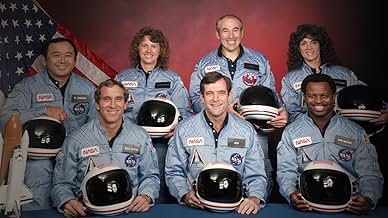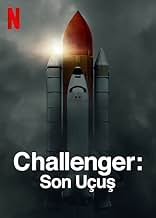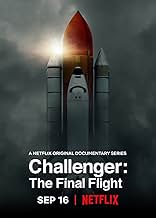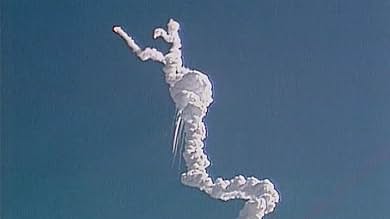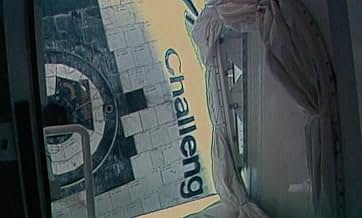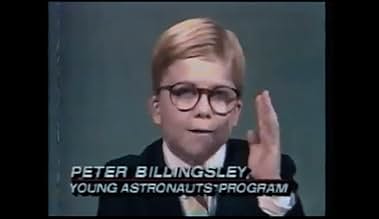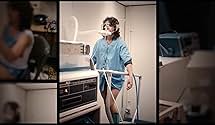IMDb-BEWERTUNG
7,8/10
8372
IHRE BEWERTUNG
Füge eine Handlung in deiner Sprache hinzuFour-part docuseries on the 1986 Challenger space shuttle disaster, unpacking an indelible moment for a generation of Americans.Four-part docuseries on the 1986 Challenger space shuttle disaster, unpacking an indelible moment for a generation of Americans.Four-part docuseries on the 1986 Challenger space shuttle disaster, unpacking an indelible moment for a generation of Americans.
- Stoffentwicklung
- Hauptbesetzung
- Auszeichnungen
- 2 Nominierungen insgesamt
Folgen durchsuchen
Empfohlene Bewertungen
I rarely cry over any television program or film, but this one did me in. I was 13 years old when the Challenger tragedy occurred, and my school had each class watch it live on TV. I will never forget the feeling of watching this happen real time, when my classmates and I were so thrilled and excited about an everyday school teacher going into space. It gave us all hope that we could do anything we wanted to do if we wanted it badly enough. Then, the unthinkable happened. They actually canceled school the next day to allow our young minds and hearts to come to terms with what we saw.
Like the tragedy of the Titanic, this is a bold reminder that mankind is NOT infallible and is inherently fragile. We may *advance* beyond our wildest dreams, but whenever human involvement is part of the equation, the worst can happen.
My heart goes out to the families and friends of these seven brave crewmembers and all of the others who have perished in other disasters. I had forgotten that they were able to retrieve the bodies of the Challenger crew. Hopefully that provided some sense of peace for those who continue to mourn their loss
RIP: Michael J. Smith Francis R. (Dick) Scobee Ronald E. McNair Ellison S. Onizuka Sharon Christa McAuliffe Gregory Jarvis Judith A. Resnik
You are true American HEROES and I will never forget you and your sacrifice.
Like the tragedy of the Titanic, this is a bold reminder that mankind is NOT infallible and is inherently fragile. We may *advance* beyond our wildest dreams, but whenever human involvement is part of the equation, the worst can happen.
My heart goes out to the families and friends of these seven brave crewmembers and all of the others who have perished in other disasters. I had forgotten that they were able to retrieve the bodies of the Challenger crew. Hopefully that provided some sense of peace for those who continue to mourn their loss
RIP: Michael J. Smith Francis R. (Dick) Scobee Ronald E. McNair Ellison S. Onizuka Sharon Christa McAuliffe Gregory Jarvis Judith A. Resnik
You are true American HEROES and I will never forget you and your sacrifice.
I can remember this as a kid and always had a fascination with the disaster. And this is a amazing documentary. Brings back so many feelings.
I found it interesting that the name "Roger Boisjoly" wasn't mentioned once. The man who probably fought harder than anyone to fix the o-ring problem gets passed by?
While the series held my interest for all four episodes, a little more tech and a little less teacher would have been better, for me at least.
I've seen every documentary on space and the Challenger that have been produced. Many were bad, some were good. This four part series is pretty good, covering familiar ground and likely a good refresher for anyone who lived through those times, or more beneficially for those younger people who are just raising their awareness and understanding of this troubling catastrophe.
The producers did use the "it's going to blow up" scenario as the dramatic leverage (e.g. cliffhanger) here. I think its overuse is justifiable, though, given the fact that if the NASA decision makers had listened to the whistleblowers and weighed the risks, the crew would have been pulled off Challenger until corrective design changes could be made (or at the very least, until a launch attempt in February when temperatures were above freezing could be attained).
One remarkable thing to note: Americans were proud of our accomplishments then, and the early footage of the shuttle launches proves it with various video segments showing people actually waving flags and saying how proud they were of their country. It is sad to think that that very footage seems so alien now, given how bad many citizens of America love to trash their own country.
The producers did use the "it's going to blow up" scenario as the dramatic leverage (e.g. cliffhanger) here. I think its overuse is justifiable, though, given the fact that if the NASA decision makers had listened to the whistleblowers and weighed the risks, the crew would have been pulled off Challenger until corrective design changes could be made (or at the very least, until a launch attempt in February when temperatures were above freezing could be attained).
One remarkable thing to note: Americans were proud of our accomplishments then, and the early footage of the shuttle launches proves it with various video segments showing people actually waving flags and saying how proud they were of their country. It is sad to think that that very footage seems so alien now, given how bad many citizens of America love to trash their own country.
I have spent much of my adult life avoiding thinking about this tragedy. It is a case study on how an organization can become wicked and its members essentially the epitome of evil.
For me it was just horribly sad to watch this and there is a prevalent sense of horror as events move toward the inevitable ending.
What made it worth watching for me was to learn about Feynman's role. I knew the outline of it but not the specifics. It's quite amazing.
What astonishes me is there are these awful, old, gross NASA administrators who are still totally unrepentant, although they are clearly and obviously to blame for what happened.
For me it was just horribly sad to watch this and there is a prevalent sense of horror as events move toward the inevitable ending.
What made it worth watching for me was to learn about Feynman's role. I knew the outline of it but not the specifics. It's quite amazing.
What astonishes me is there are these awful, old, gross NASA administrators who are still totally unrepentant, although they are clearly and obviously to blame for what happened.
Wusstest du schon
- WissenswertesWhile the Challenger crew were the first to die during a mission, they were not the first NASA crew to be killed. The three-man crew of Apollo 204 (aka, Apollo 1), Gus Grissom, Roger B. Chaffee and Edward H. White II were killed in a fire in their capsule during a launch practice run on the launch pad on January 27, 1967. The docuseries makes no mention of this earlier fatality (what the NASA engineer said was that no NASA astronaut had been "killed on their way to space" to fit the narrative of the Challenger deaths, so it was a matter of semantics).
Top-Auswahl
Melde dich zum Bewerten an und greife auf die Watchlist für personalisierte Empfehlungen zu.
- How many seasons does Challenger: The Final Flight have?Powered by Alexa
Details
- Erscheinungsdatum
- Herkunftsland
- Offizieller Standort
- Sprache
- Auch bekannt als
- Challenger: The Final Flight
- Produktionsfirmen
- Weitere beteiligte Unternehmen bei IMDbPro anzeigen
- Laufzeit45 Minuten
- Farbe
- Sound-Mix
Zu dieser Seite beitragen
Bearbeitung vorschlagen oder fehlenden Inhalt hinzufügen

Oberste Lücke
By what name was Der letzte Flug der Challenger (2020) officially released in India in English?
Antwort


